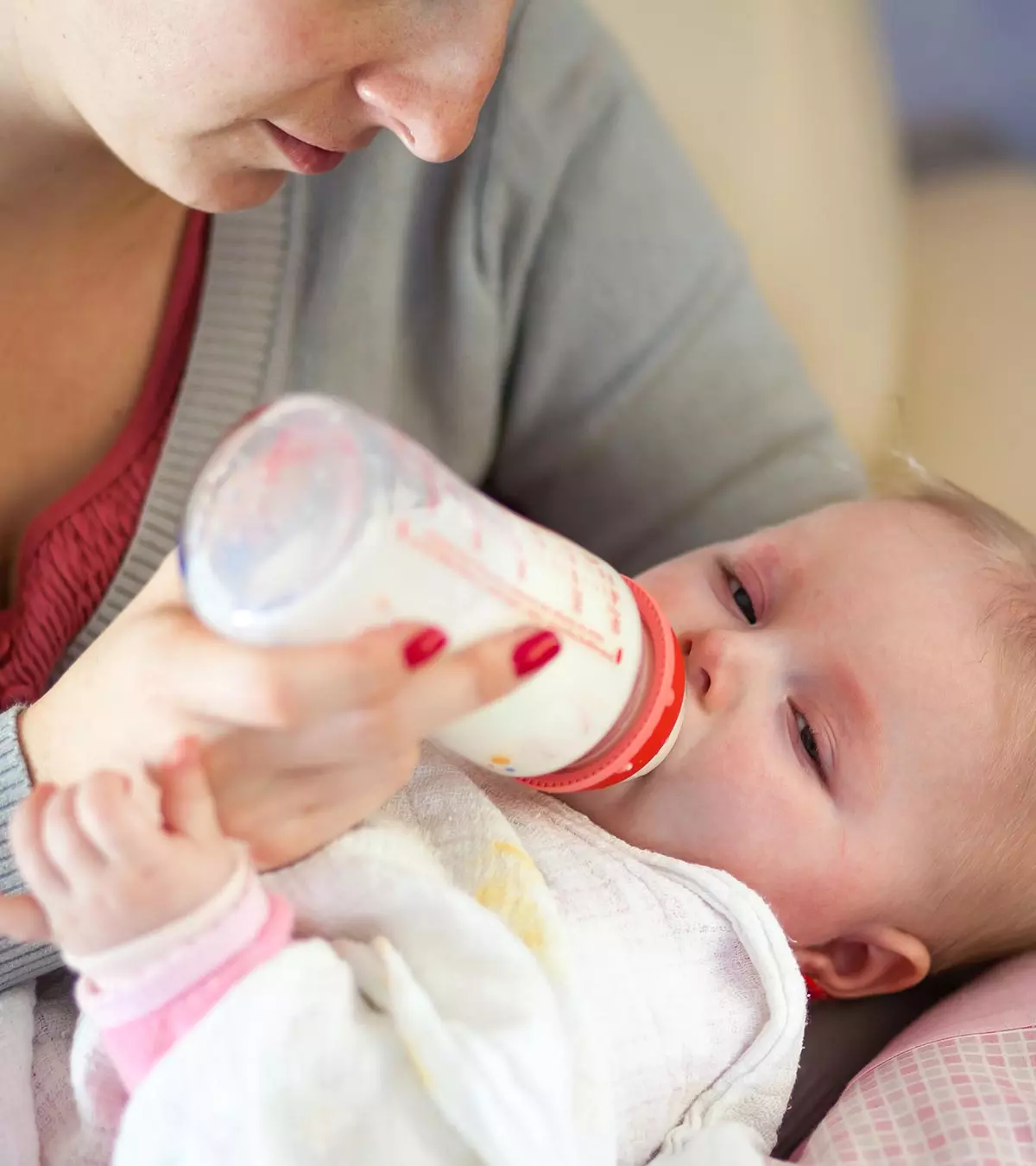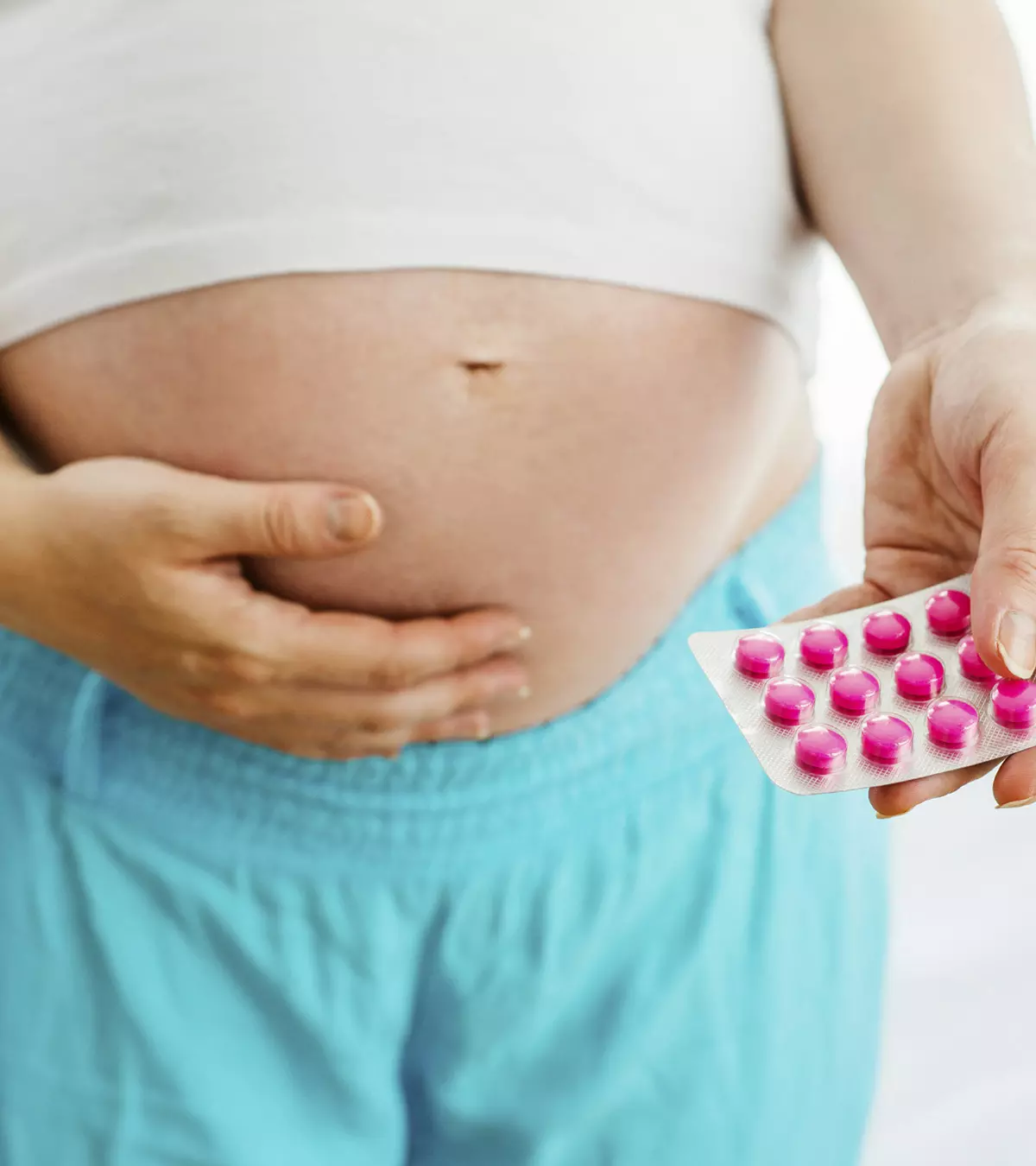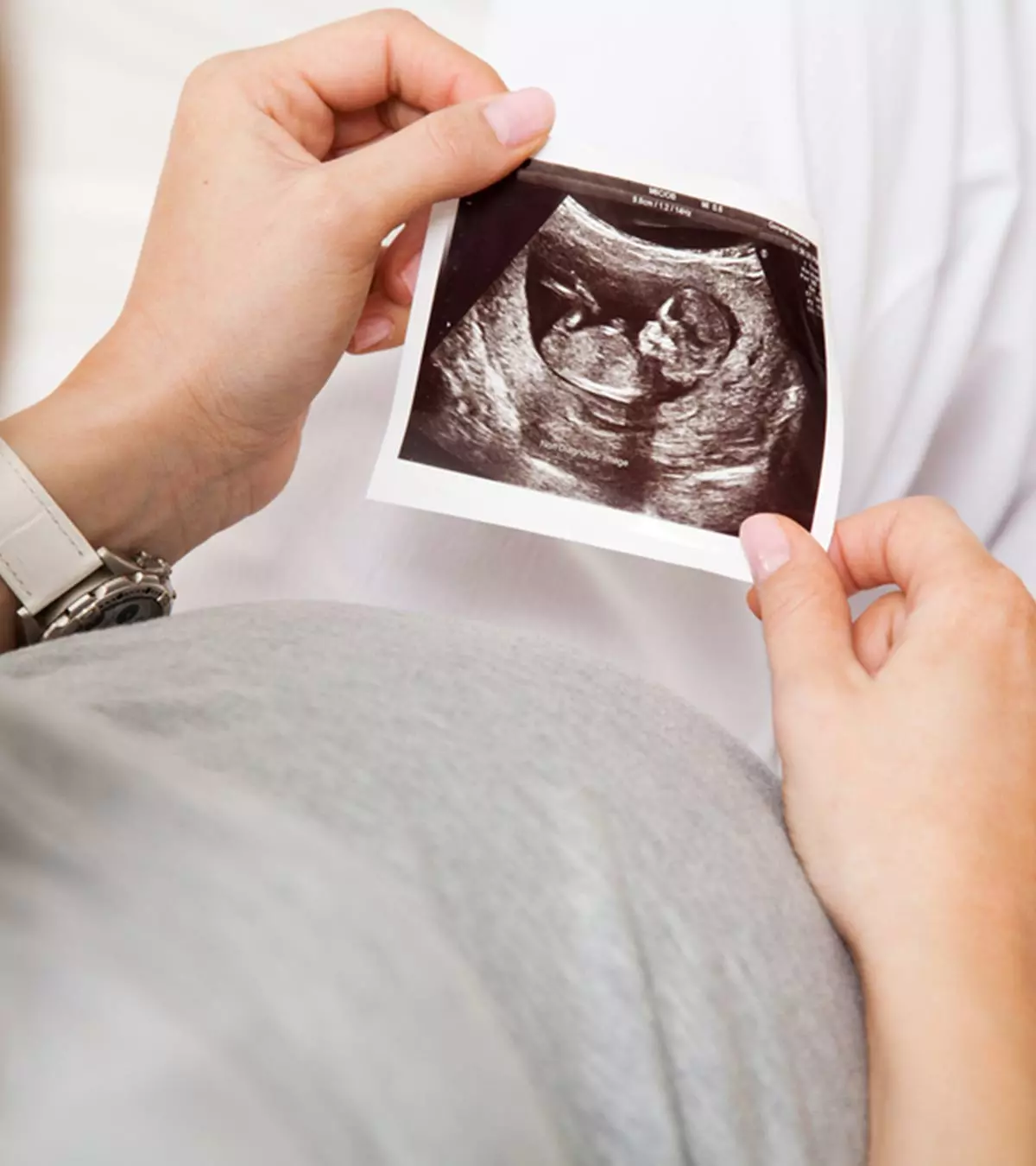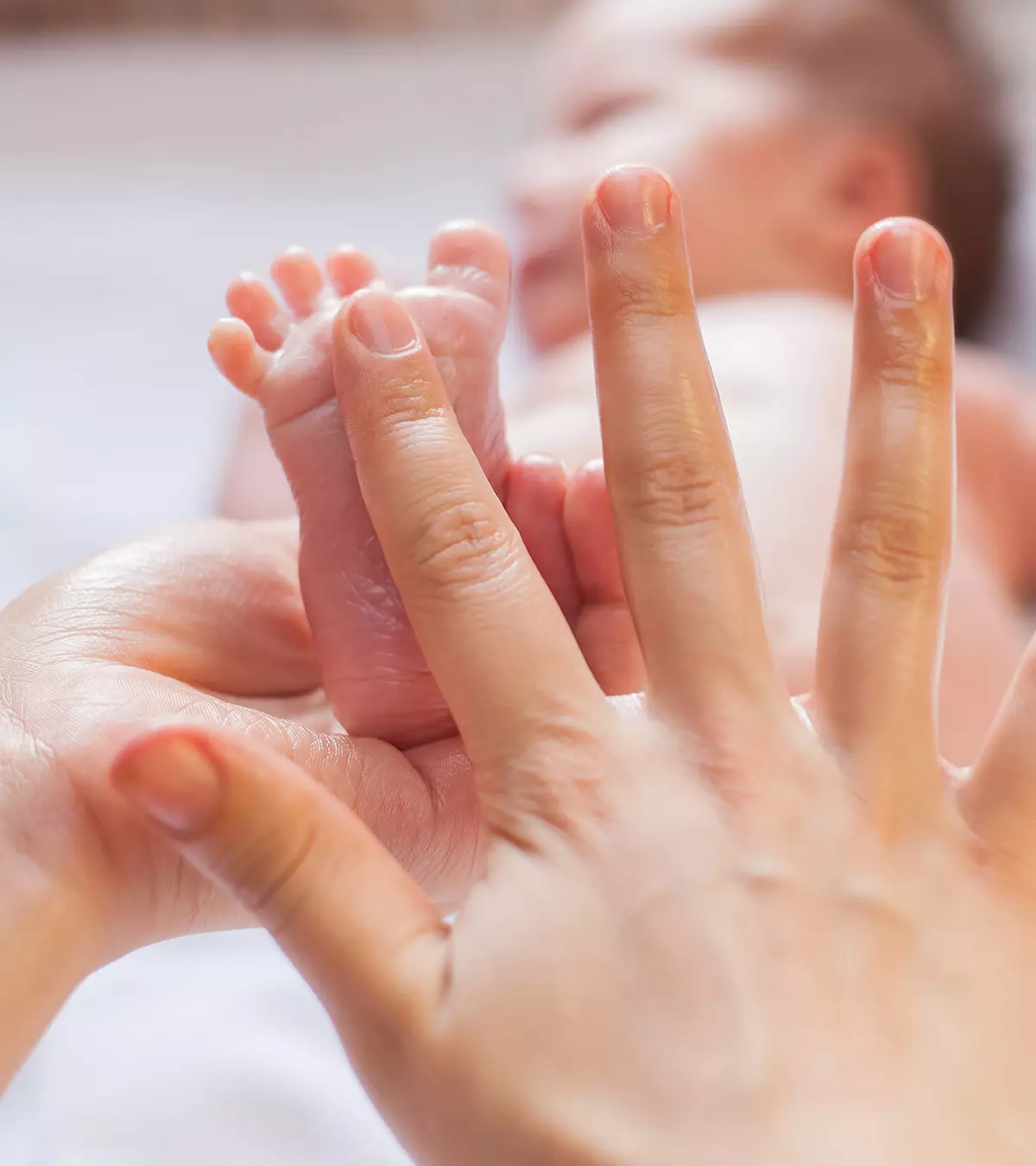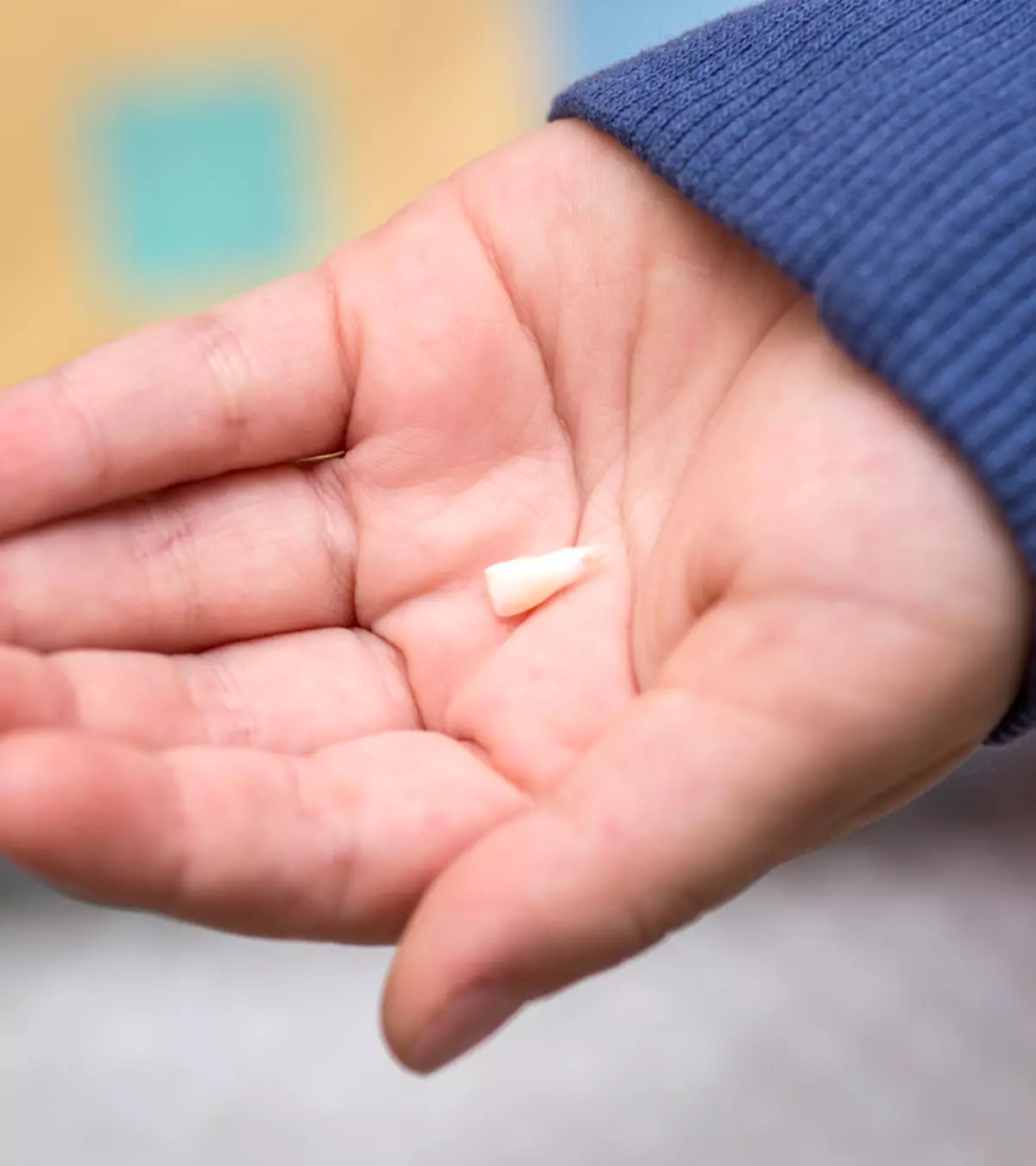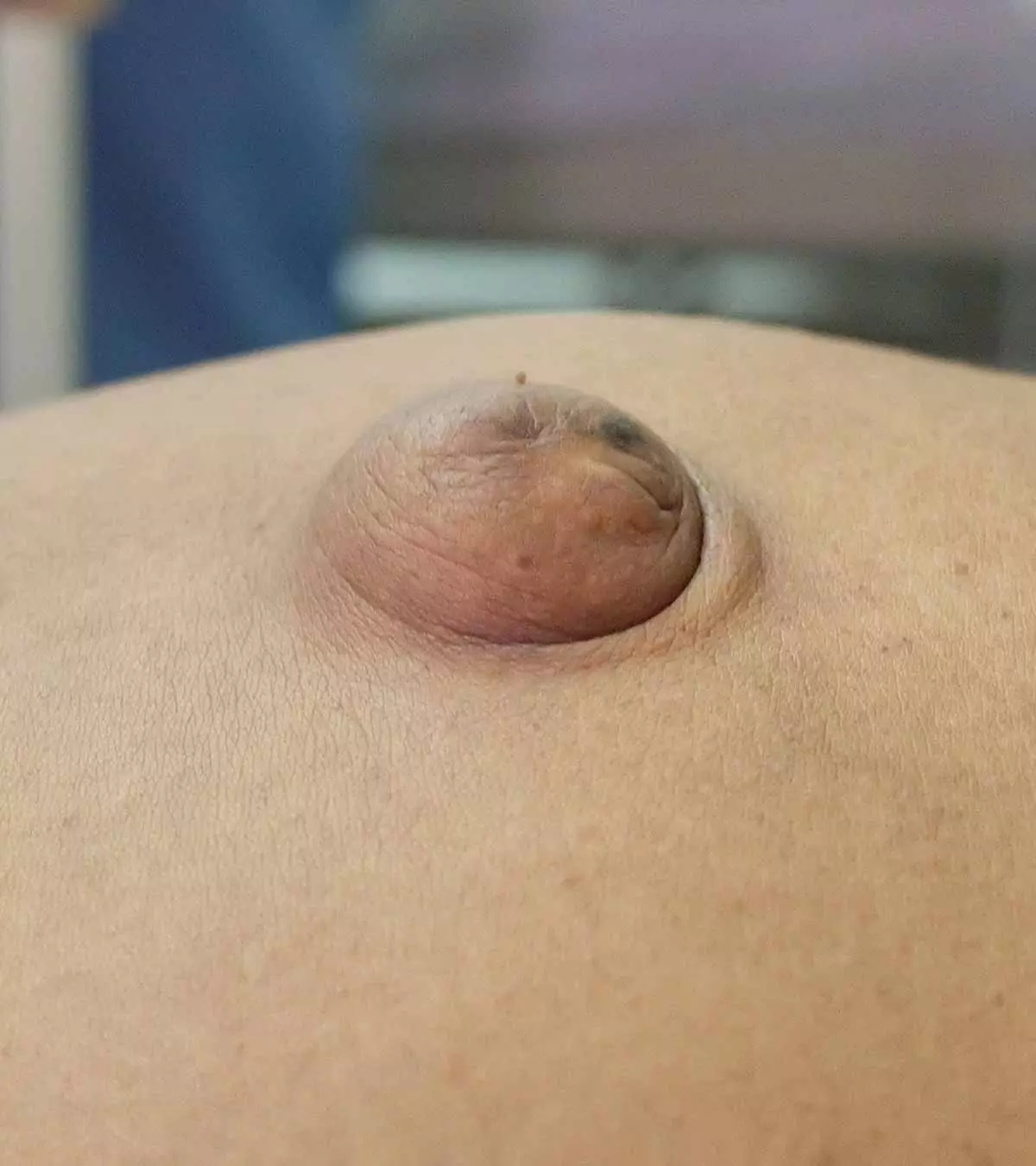
Image: iStock
Pregnancy typically lasts 40 weeks, divided into first, second, and third trimesters. Different symptoms and physical developments characterize each stage. The beginning of pregnancy is calculated from the first day of the last menstrual period (LMP) (1).
After every menstrual cycle, a woman’s body starts preparing for pregnancy. Since knowing the exact date of conception is difficult, doctors refer to the first day of the last menstrual cycle as the start of the pregnancy (2). Ovulation begins after about 12-14 days of LMP, as the egg is released. This is when conception or fertilization is likely to occur if you have unprotected intercourse (3).
In this post, you might learn about the second week of pregnancy, including the symptoms and the measures to follow for baby development.
Key Pointers
- At the beginning of the second week of pregnancy, the fetus appears as a mass of cells that isn’t detectable through ultrasound.
- Though most women don’t have any prominent symptoms, some may experience sudden lower abdominal pain on either side or increased body temperature.
- Tracking your ovulation, adopting a healthy lifestyle, and avoiding toxic substances, such as alcohol, are a few things to do at two weeks of pregnancy.
What Happens At Two Weeks Of Pregnancy?
The first day of the reproductive cycle begins as soon as the last menstrual period ends. At the beginning of the second week, the dominant follicle containing the egg releases an increased amount of estrogeniA sex hormone responsible for the development of female sexual characteristics , stimulating the pituitary glandiA tiny pea-sized gland situated behind the bridge of the nose and controls other hormone glands in the body to release the luteinizing hormoneiHormone that stimulates ovulation in women and causes testicles to make testosterone (LH) by day 12. Around day 13, a surge in the LH levels causes the follicles to burst open and release the egg. By day 14, fertilization occurs in the fallopian tubeiPair of tubes that carry eggs from ovaries to the uterus in women followed by implantationiThe process of the embryo finding its way through the fallopian tubes and into the uterus, where it attaches to the walls in the uterus about six days after fertilization (3) (4).
At two weeks pregnant, the baby is made of only a few cells, and fetal development may not be detectable through an ultrasound. The mother’s belly generally does not appear bloated and there are no distinguishable pregnancy symptoms during the second week. It could be around the third or fourth week when the typical pregnancy symptoms, such as missed periods, nausea, and morning sickness, start to manifest as the embryo develops.
What Are The Signs And Symptoms At 2nd Week Pregnancy?
Since fertilization only occurs by the end of the 2nd week, you may not observe any symptoms. However, some women might experience (5):
- Discharge of a fine mucus layer, with an appearance similar to that of an egg yolk.
- Sudden lower abdominal pain on either side, indicating release of the egg.

- An increase in temperature, which can occur after ovulation.
Other possible signs and symptoms might include:
- Tender and sore breasts

- Random mood swings
- Frequent urination
- Unusual and constant tiredness
- Constant bloating or gas
- Changes in cervical mucus (6)
These symptoms during the second week of your menstrual cycle may indicate the beginning of your gestation period although they are not very reliable at this stage.
Sarah, a vlogger, shares the early pregnancy symptoms she experienced when she was two to three weeks pregnant. She says, “My breasts were incredibly sore. I also had intense cramping, unlike the usual period pain – it’s annoying and feels like a dull ache in my back and stomach. Throughout the entire two weeks, I had a constant dull lower backache, which is different from my period pain that usually occurs only on the first day of bleeding, but this backache persisted since conception.
“The period cramps were so severe that I even went out and bought a heat pack to soothe the discomfort by placing it on my tummy. I noticed mood swings, where I became moody and would cry easily (i).”
It’s important to note that each person’s symptoms may differ. Some pregnant individuals may not go through any of the early pregnancy signs mentioned above.
Can A Pregnancy Test Give A Positive Result At Two Weeks Of Pregnancy?
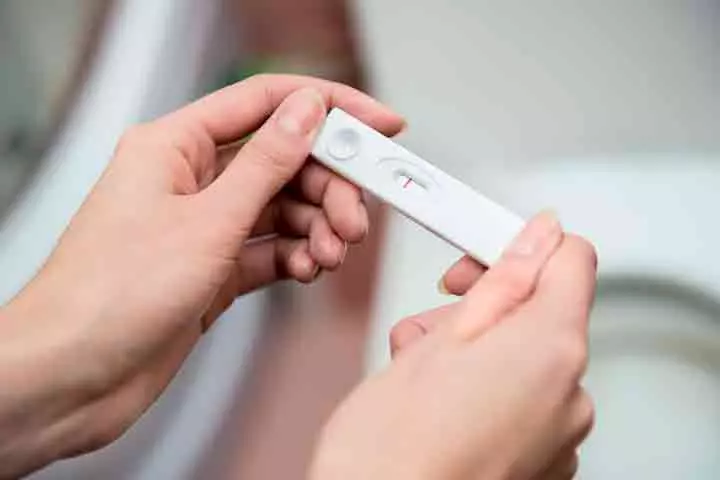
A pregnancy test is based on detecting the levels of human chorionic gonadotropin hormoneiProduced in the placenta, the hCG hormone is vital in establishing and maintaining early pregnancy (hCG). It is released by special cells called syncytiotrophoblast around ten days post-conception until the placenta is fully formed later in the first trimester, which then takes over this function fully. Hence, an accurate pregnancy test at two weeks of pregnancy may not be possible.
You can expect to have a positive pregnancy test result after two weeks of fertilization, i.e., during the fourth week of pregnancy when there is an increased hCG concentration in the blood and urine. A pregnancy test can be carried out through pregnancy test kits or a blood test. You can use the test kit two weeks after conception for an accurate result (7).
 Quick fact
Quick factWhat To Do At Two Weeks Of Pregnancy?
If you are entering the ovulation phase and are planning to get pregnant, you may try the following for pregnancy (2) (5).
- Keep track of ovulation: You must plan according to your ovulation cycle if you plan to have a baby. For pregnancy to occur, sperm should fertilize the egg when it reaches the fallopian tube. Knowing the time of ovulation or the fertility window can help you plan your intercourse timing and increase your chances of achieving a successful pregnancy. You can use an ovulation kit that measures the urine level of LH, responsible for the release of egg from the follicle.
 Quick tip
Quick tip
- Change to a better lifestyle: For better prenatal care try to have a healthier lifestyle with regular exercise and a well-balanced diet. A change in your otherwise lazy or hectic day-to-day life can provide a healthier environment for your baby.
- Increase vitamin intake: Increase the intake of prenatal vitamins after consultation with healthcare providers. Early start of prenatal vitamins consisting of folic acid can help protect your baby from possible birth defects. Folic acid aids the formation of the neural tube, which later develops into the skull, spine, and brain. Neural tube defects include birth defects of the brain and spine, such as spina bifida and anencephaly, which are the most common types. According to the statistics from the CDC, approximately 1427 babies are affected by spina bifida, and 847 babies are affected by anencephaly in the US annually. You should ideally start taking folic acid at least three months prior to planning pregnancy. This is particularly important for those who have diabetes mellitus.

- Avoid toxic substances: Do not consume substances that can harm not only your health but also your expecting baby by increasing the risks for a miscarriage, stillbirth, and preterm labor. These can include tobacco, alcohol, recreational drugs, or caffeine.
- Monitor current drugs: Certain groups of drugs may cause adverse effects on the development of the baby’s organs, especially if taken during the initial days of pregnancy. Consult your healthcare provider about continuing any ongoing medications to avoid harmful effects of those medications on pregnancy.
Frequently Asked Questions
1. Which part of my stomach will hurt in early pregnancy?
During early pregnancy, you may feel pain in the lower abdomen due to implantation and growing uterus (8).
2. Are cramps normal in two weeks of pregnancy?
Cramps are normal in early pregnancy and are usually not a cause of concern. These cramps are often similar to your menstrual cramps. Once you pass your first trimester, the cramping reduces (8).
3. What are the chances of having twins during the second week of pregnancy?
The likelihood of naturally conceiving twins is approximately one in every 250 pregnancies. An ultrasound is used to confirm a twin pregnancy (9).
4. What foods should a woman eat during the second week of pregnancy?
Expectant mothers should incorporate fruits, vegetables, grains, cereals, calcium and iron-rich foods, and ample water into their pregnancy diet (10).
5. What kind of exercise is safe during the second week of pregnancy?
During the second week of pregnancy, you can continue to perform mild exercises. However, if you experience any discomforts or complications, it is advisable to avoid specific workouts and consult a healthcare professional to learn the safe exercises (11).
Since the first day of pregnancy is considered from the last day of menstruation, there is a chance you may not be actually pregnant during the second week of pregnancy. Even if you have conceived, there is a possibility that you may not even be aware of your pregnancy during the second week since there can be no evident changes in the mother’s body so early. At two weeks pregnant, it is not possible to detect the fetus through ultrasound or prenatal screening. Hence, if you are trying to conceive, you should track your pregnancy and ovulation and try accordingly.
Infographic: Early Signs Of Pregnancy To Check
Many women remain unaware of their pregnancy at two weeks of gestation because of the subtle signs of pregnancy you may experience at this stage. Check out the infographic below to learn about these signs to ensure you know about your pregnancy from the beginning.
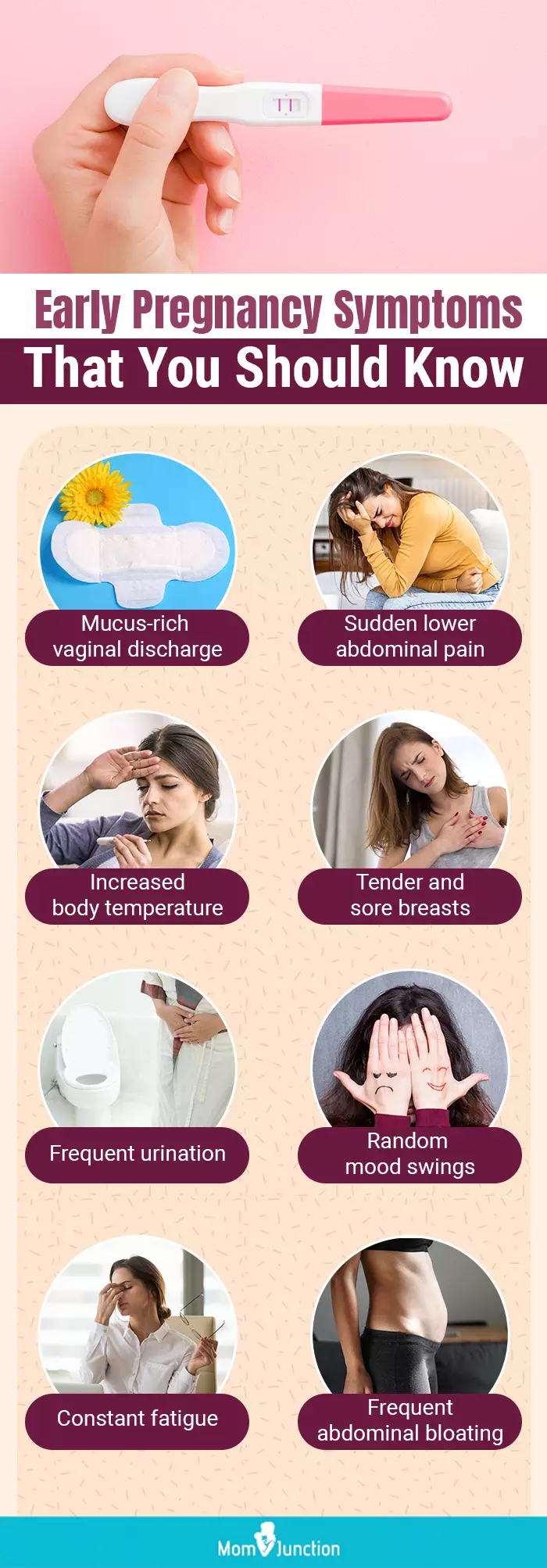
Illustration: Momjunction Design Team
Illustration: 2 Weeks Pregnant: Symptoms Baby Development & Tips To Follow

Image: Dall·E/MomJunction Design Team
Personal Experience: Source
MomJunction articles include first-hand experiences to provide you with better insights through real-life narratives. Here are the sources of personal accounts referenced in this article.
i. Symptoms of pregnancy; First Weeks; Signs to look out for/How I knew.https://www.youtube.com/watch?feature=shared&v=1LfcZebVWYg
References
- How your fetus grows during pregnancy.
https://www.acog.org/womens-health/faqs/how-your-fetus-grows-during-pregnancy - Pregnancy week 1-2.
https://americanpregnancy.org/healthy-pregnancy/week-by-week/pregnancy-week-1-2/ - Pregnancy: month by month.
https://www.plannedparenthood.org/learn/pregnancy/pregnancy-month-by-month - Menstrual cycle.
https://www.ucsfhealth.org/education/the-menstrual-cycle - 2 weeks pregnant: optimizing your chances for fertilization.
https://www.healthywomen.org/your-health/pregnancy–postpartum/2-weeks-pregnant-symptoms-and-signs - Cervical Mucus.
https://my.clevelandclinic.org/health/body/21957-cervical-mucus - Signs of pregnancy/pregnancy test.
https://www.urmc.rochester.edu/encyclopedia/content.aspx?contenttypeid=85&contentid=P01236 - When should cramps in pregnancy be worrisome?
https://wfmchealth.org/maternity-health-care/when-should-cramps-during-pregnancy-be-worrisome/RF - Twin pregnancy.
https://my.clevelandclinic.org/health/articles/23158-twin-pregnancy - Pregnancy and diet.
https://www.betterhealth.vic.gov.au/health/healthyliving/pregnancy-and-diet - How active should I be in pregnancy?
https://www.tommys.org/pregnancy-information/im-pregnant/exercise-in-pregnancy/how-active-should-i-be-pregnancy#:~:text=During%20the%20first%20trimester%20(weeks,gently%20and%20build%20up%20slowly.
Community Experiences
Join the conversation and become a part of our nurturing community! Share your stories, experiences, and insights to connect with fellow parents.
Read full bio of Dr. Niraj Krishnamurthy Yanamandra
Read full bio of Aneesha Amonz
Read full bio of Rebecca Malachi
Read full bio of Reshmi Das








